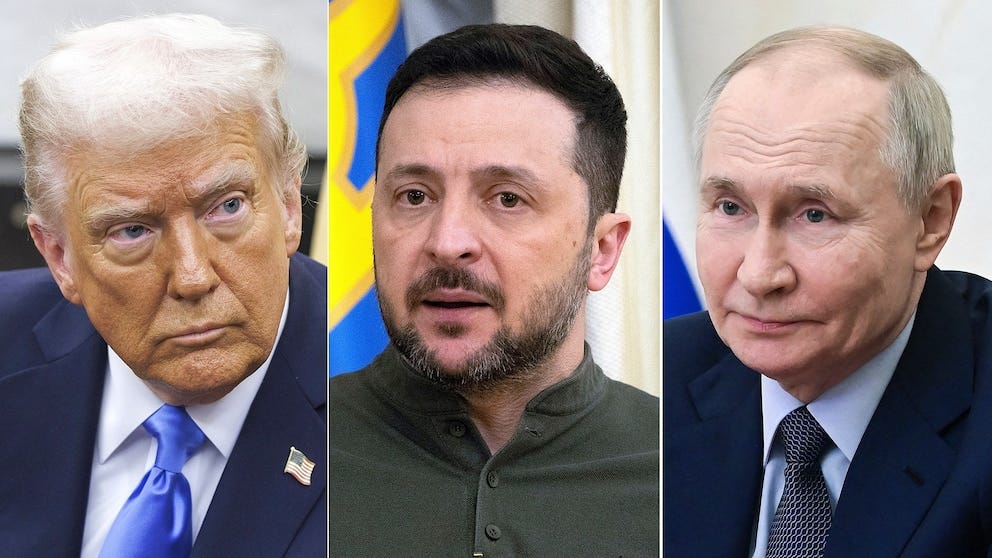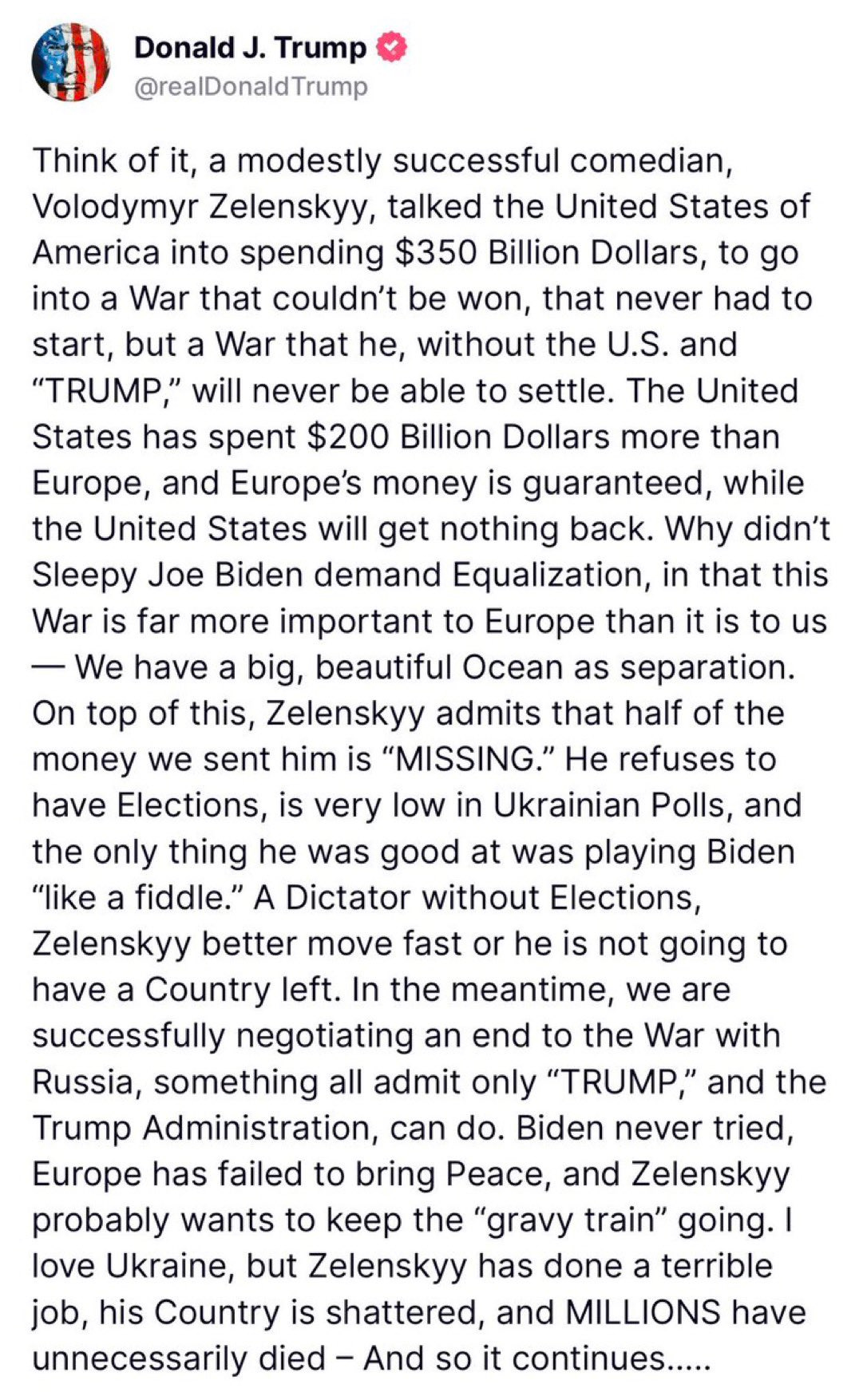These are dark days. In less than a month, the restored Trump presidency has appeared to dismantle, at least for now, many of the traditional pillars and assumptions of the post-war era. A month ago, Joe Biden was President of the United States, and for all of his sclerotic tendencies and faults, while he held that office no-one was in any doubt where the President stood: that he believed in the Western alliance, favoured democracies, abhorred autocracies, and would defend Europe. Now Donald Trump is the President of the United States, and all of that is gone. We were told by Trump’s supporters, that he would strengthen, indeed save the Western alliance. A month into his presidency, it has all but collapsed. It’s hard to think of such a rapid transformation in the geopolitical disposition of a superpower in such a short time. The postwar order fell, gradually then suddenly.
For the first time ever, virtually every European state now has some reason to think of the United States, long its strategic leader and security guarantor, as a competitor if not even adversary. Even writing the words feels dizzying. This is because the United States under Trump seems eager not just to chart neutrality, but engage an active embrace of Russia, and create a new US/Russia axis. The implications for Europe would be staggering. NATO might still exist, but it is hollow, a Potemkin organisation, as if the League of Nations still existed. Does anyone seriously believe Trump would now honour Article 5 if it were invoked? It’s as if we’ve all fallen into an updated version of Philip Roth’s Plot Against America, with Trump as a modern day Charles Lindbergh. But there’s no closing of the book, no tidy end of this chapter. Even if Trump were to recant, and adopt a more traditional American political position, the trust would be gone.
Trump told us that he would be a president who was less inclined to support Ukraine. There was a world where he had come to office, and for reasons of pure realpolitik, of unsparing and unsentimental logic, said that supporting Ukraine was not worth the cost. This would, in my view, have been cynical and strategically short-sighted, but it would have had an internal Trumpian coherence, within the realms of acceptability. What is so disturbing is not what Trump is doing but how he is doing it. He has not just accepted Russia’s strategic superiority but Russia’s confected realities. Trump has publicly accepted that Ukraine, not Russia, was responsible for the war- has claimed that they could have stopped it and regurgitated Kremlin talking points that Zelensky is a thief, and a dictator and that he should hold an election, a contest Putin would almost certainly seek to manipulate and undermine. Trump does this having lauded Putin, a man who hasn’t held a free or fair election in years and who has prevented elections in Ukraine because he invaded it.
It is not worth your time or mine to fact check any of this. It would be as to fact check the Ministry of Love, the inane ramblings of a propaganda minister, or a toddler, talking to themselves. But this is a toddler nominally in charge of the West. Trump’s reflux up of this Putiniste vomit serves to relegitimate Putin and delegitimise the Zelensky government, one of Russia’s key aims. It would be as if Roosevelt had labelled Churchill a dictator as the Luftwaffe rained hell down on London. The Russian attacks on Ukrainians civilians haven’t stopped by the way- the Americans didn’t even get that in exchange for the pictures, beamed around the world, of an ashen but gutless Marco Rubio sat alongside the delighted serpentine Sergei Lavrov, a man literally sanctioned by the US government for warcrimes. Indeed, Putin has said that he won’t even guarantee a meeting with Trump, that Trump must go further before he agrees to a summit. He is entirely in the driving seat despite the US spending the week alienating its own allies, giving Russia nearly all of what it wanted, buying Putin’s warped view of history, and Trump can’t even guarantee a meeting. The art of the deal, indeed.
Why is Trump doing it? Why is he cleaving to Putin so tightly? I think there are four key reasons.
Radicalisation: There has been a profound radicalisation of the American new right, especially online. The MAGA information system is whole and hermetically sealed, and has been given new impetus by Musk, who spreads misinformation and amplifies far right messaging daily. A Trump cipher from the America First Institute claimed on Newsnight on Tuesday that more people are locked up in the UK for freedom of speech violations than Russia. Whether she believes this nonsense or not it is currently a meme doing the rounds in the MAGA online space. Trump himself may well believe the stuff he’s reading and saying.
Ideational: Trump and the MAGA movement like what Putin stands for. They like and admire the fact he is an authoritarian and autocrat. With the collapse of the power of Congress (by its own hand) and the erosion of the authority of the courts, it is the direction Trump and his movement are taking the United States. They also see Russia and Putin as being on their side in the civilisational struggle they care most about: not between democracies and autocracies, but between liberal cosmopolitans and nativism, between international institutions and unbridled nationalist nation states. They have always admired him as traditionalist and a cultural conservative. It is no surprise that Putin has long been lauded by the radical right, even before Trump came along. Fundamentally, they see him as one of their own, in one form or another. It’s the same reason as they defend a whole cast of unsavoury characters from Andrew Tate to Tommy Robinson. The enemy of Trump’s enemy, is his friend.
Commercial: Trump and his allies have been quite open about the financial opportunities they see from the normalisation of relations with Russia. Some of this will be legitimate. You can imagine plenty won’t be.
Strategic: This is part of a much bigger game and it’s against China. Henry Kissinger once famously wrote: “It should be the U.S. policy to maintain closer relations with either Russia or China than they have with each other.” This belief partly lay behind Nixon’s normalisation of relations with Beijing. Trump admires Putin and crucially doesn’t perceive him as a threat. They believe (correctly) that Russia isn’t a serious strategic competitor to the United States. Its economy is stagnant, its military exhausted, its population ageing, its technology backward. China, by contrast, is the second empire of the world and the US’ main rival, as well as being one of Trump’s few consistently long-standing preoccupations. They want to drive a wedge through the alliance between China and Russia fostered by the Ukraine war, and cleave Russia away. In exchange, they’re not only happy to throw Ukraine under the bus, but most of Europe too, handing Putin what he wanted all along- not only a puppet Ukraine, but a restored sphere of influence which runs alongside much of the old Warsaw Pact.
Personal animus: Trump is likely still resentful that Zelesnky did not help him with a (highly improper) dirt gathering exercise against the Biden family in 2019. Trump is also prone to taking against highly charismatic figures who outshine him, especially those admired by the liberal media he claims to despise but whose approbation he secretly covets.
Trump’s approach is chaotic and haphazard. But I believe these elements and this strategic move is what unites the comments from Hegseth, Vance and Trump himself this last month. It’s too tempting to assume Trump is making it up as he goes along. This is part of something much deeper. Europe’s thinking must be all the bigger as a result. Kissinger said something else: “America has no permanent friends or enemies, only interests.” Never has that felt truer.
P.S. We discussed this more on Wednesday’s News Agents. Listen here.






Remember when Zelensky refused to do Trump‘s bidding to fabricate dirt on Joe Biden?
That feeling of needing to get back at Zelensky may also be part of motivation for Trump.
The view that Europe should collectively fund the defence of Ukraine and rely much less on the US is a reasonable one. Europe needs to coordinate a much stronger and more effective defence of Ukraine. However, only the US can provide the nuclear deterrent. I can't even see it as realistic or even desireable that Europe starts stockpiling nuclear weapons in sufficient quantities to deter Russia. An alliance between the US and Russia is a frightening prospect for us all. Both Putin and Trump have threatened to use nuclear weapons to achieve their aims. If they no longer keep each other in check, the chance of nuclear war increases substantially.